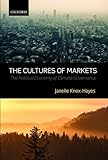The cultures of markets : the political economy of climate governance / Janelle Knox-Hayes.
Material type: TextPublisher: New York : Oxford University Press, 2016Copyright date: ©2016Edition: First editionDescription: xxiii, 319 pages : illustrations ; 24 cmContent type: text Media type: unmediated Carrier type: volumeISBN: 9780198718451; 0198718454Subject(s): Emissions trading | Emissions trading | Klimapolitik | Internationale Klimapolitik | Emissionshandel | Klimaschutz | Umweltökonomik | Markt | WeltDDC classification: 363.7/387 LOC classification: HC79.P55 | K66 2016
TextPublisher: New York : Oxford University Press, 2016Copyright date: ©2016Edition: First editionDescription: xxiii, 319 pages : illustrations ; 24 cmContent type: text Media type: unmediated Carrier type: volumeISBN: 9780198718451; 0198718454Subject(s): Emissions trading | Emissions trading | Klimapolitik | Internationale Klimapolitik | Emissionshandel | Klimaschutz | Umweltökonomik | Markt | WeltDDC classification: 363.7/387 LOC classification: HC79.P55 | K66 2016| Item type | Current library | Call number | Copy number | Status | Notes | Date due | Barcode |
|---|---|---|---|---|---|---|---|
 Books
Books
|
Female Library | HC79.P55 .K66 2016 (Browse shelf (Opens below)) | 1 | Available | STACKS | 51952000329459 | |
 Books
Books
|
Main Library | HC79.P55 .K66 2016 (Browse shelf (Opens below)) | 1 | Available | STACKS | 51952000329466 |
Includes bibliographical references (pages 289-309) and index.
Introduction: confronting climate change -- Climate change governance: institutions, values, and the culture of markets -- Universal norms versus local practice: cross-national comparison of market meaning-making -- Europe and the United States: market coordination through contrasting discourses of security, leadership, and economic opportunity -- Australia and South Korea: technocratic governance at the interface of politics and international aspiration -- Japan and China: cultural norms mediated through crisis and environmental context -- The cultures of markets: interplay between economic and political governance -- The fate of markets: materiality and the construction of values -- Conclusion: the path towards environmental finance and sustainable valuation.
This book explores the establishment of emissions trading as a form of environmental, market-based governance. It conceptualizes markets as institutions, and analyzes them as a system of climate governance. To this end, it argues that international efforts to promulgate markets run up against local cultures of markets that shape economic practices and knowledge to different degrees. The book also examines the material implications of emissions markets on the environment and climatic systems. In sum, the study finds that cultures of markets present a substantial challenge to a universalist prescription for resolving climate change and highlights issues at the interface of political and economic governance in different political economies. This includes issues of citizen, state, and industry participation, and the materiality of economic and financial productivity.
1 2

There are no comments on this title.